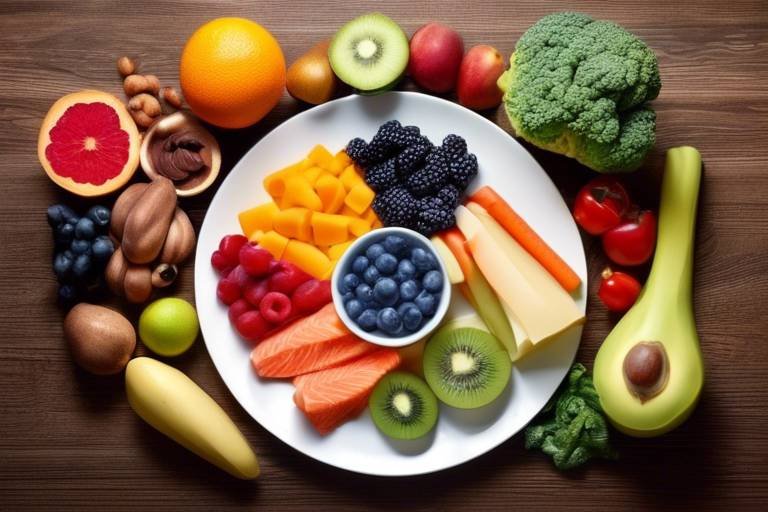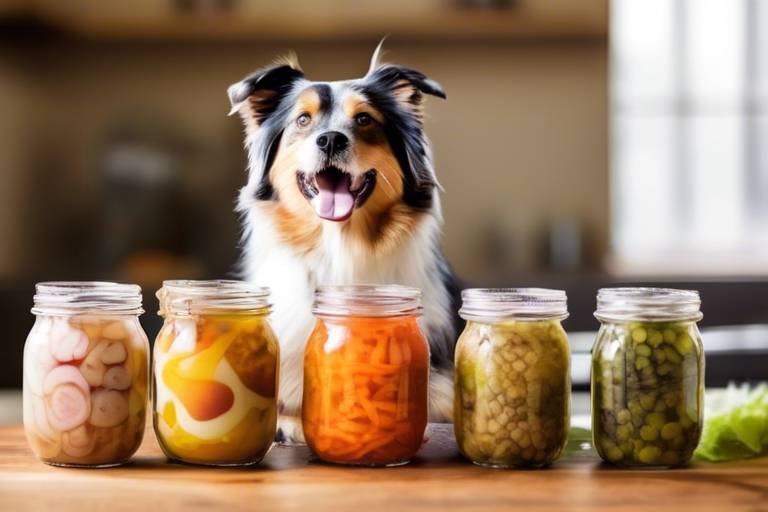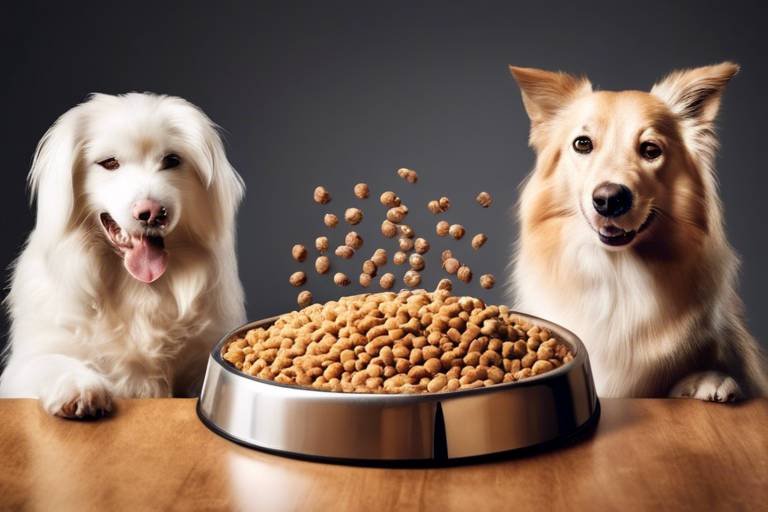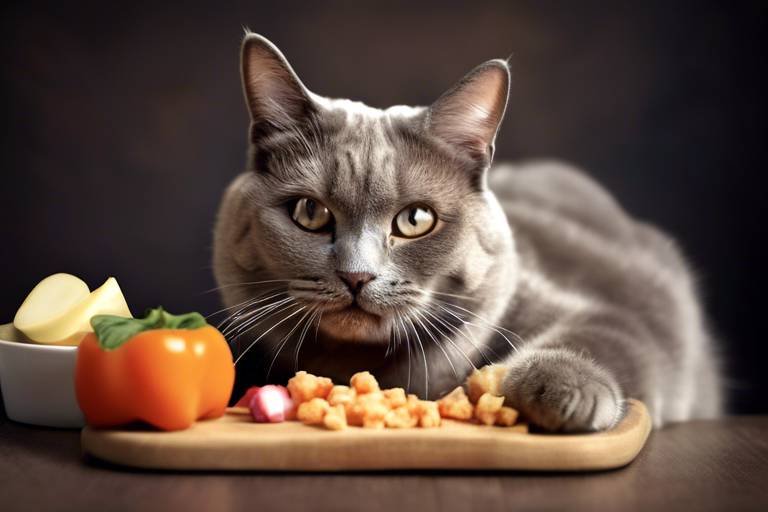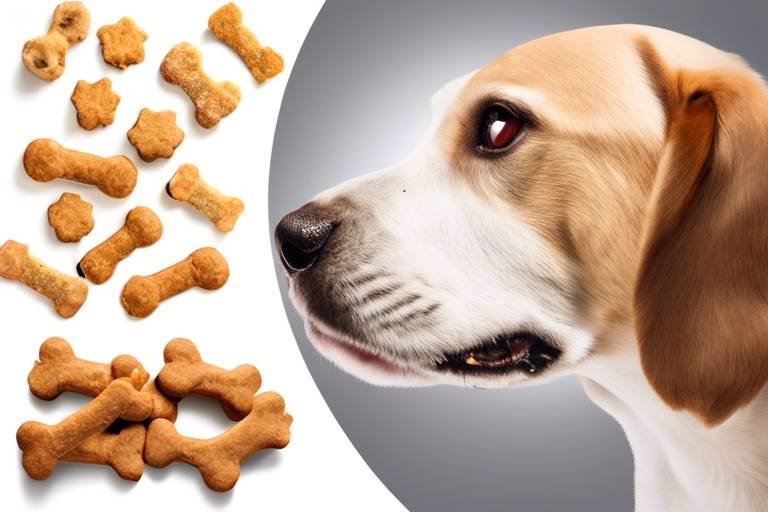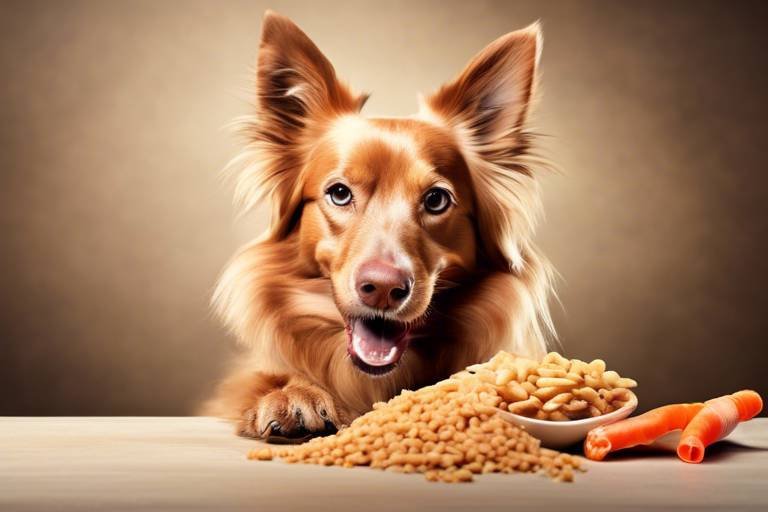The Benefits of Incorporating Superfoods into Pet Meals
As pet owners, we all want the best for our furry companions. Just like us, our pets need a balanced diet to thrive, and that's where superfoods come into play. These nutritional powerhouses are packed with vitamins, minerals, and antioxidants, making them an excellent addition to your pet's meals. Imagine transforming your pet's diet into a vibrant, health-boosting feast! By incorporating superfoods, you can enhance your pet's overall well-being and vitality. But what exactly are superfoods, and how can they benefit our pets?
Superfoods are not just a trendy term; they represent a category of foods that offer exceptional health benefits. For example, foods like blueberries, spinach, and pumpkin are not only delicious but also provide a wealth of nutrients that support your pet’s immune system, digestion, and overall health. Think of superfoods as the secret ingredient in your pet’s diet that can make a world of difference. Just as a sprinkle of magic can transform a mundane dish into a culinary masterpiece, adding superfoods can elevate your pet's meals to new heights.
Incorporating these nutrient-rich foods into your pet's diet isn’t just about flavor; it’s about making mindful choices that contribute to their long-term health. Just like we choose fresh fruits and vegetables for our meals, choosing superfoods for our pets can lead to a healthier, happier life. The benefits of superfoods are vast, and understanding their role in your pet’s diet can empower you as a pet owner to make informed decisions. So, let’s dive deeper into the amazing world of superfoods and explore how they can transform your pet's meals!
Superfoods are renowned for their high nutritional value, and this is particularly important for our pets. Packed with essential vitamins, minerals, and antioxidants, these foods can significantly enhance your pet's health. For instance, foods like quinoa and chia seeds are excellent sources of protein and omega-3 fatty acids, which are crucial for maintaining a healthy coat and skin. Understanding what makes these foods so beneficial can help you make informed dietary choices for your furry friend.
Here’s a quick look at some of the key nutrients found in popular superfoods:
| Superfood | Key Nutrients | Health Benefits |
|---|---|---|
| Blueberries | Antioxidants, Vitamin C | Supports cognitive function and heart health |
| Spinach | Vitamins A, C, K, Iron | Promotes strong bones and a healthy coat |
| Pumpkin | Fiber, Beta-Carotene | Aids digestion and supports eye health |
By adding these superfoods to your pet’s meals, you are essentially enriching their diet with nutrients that can help them lead a healthier, more active life. Just like we feel more energized after eating a nutrient-dense meal, our pets can experience similar benefits. The key is to find the right balance and ensure that these superfoods complement their regular diet.
One of the most significant advantages of incorporating superfoods into your pet's meals is the boost to their immune system. A strong immune system is crucial for fighting off diseases and maintaining overall health. Certain superfoods possess properties that can help enhance your pet's natural defenses. For instance, foods rich in antioxidants, such as blueberries and spinach, can combat oxidative stress and inflammation, which are common culprits in many health issues.
Have you ever wondered how some pets seem to bounce back quickly from illness? It’s often because they have a robust immune system, and superfoods can play a vital role in building that strength. By incorporating these nutritional powerhouses into their diet, you can help your pet stay healthy and resilient against common ailments.
Antioxidants are essential for protecting your pet from oxidative stress, which can lead to chronic diseases. Superfoods high in antioxidants, such as blueberries and green tea, can significantly impact your pet's health. These ingredients help neutralize free radicals in the body, reducing the risk of cellular damage.
Blueberries are often hailed as a superfood for pets, and for a good reason! These tiny berries are packed with antioxidants that support cognitive function and heart health. They can be easily added to your pet's meals as a treat or mixed into their regular food. Imagine your pet enjoying a delicious blueberry snack while reaping incredible health benefits!
Spinach is another fantastic superfood that can contribute to your pet's well-being. Rich in vitamins and minerals, spinach supports strong bones and promotes a healthy coat. You can mix cooked spinach into your pet's food or even serve it as a tasty treat. Just like Popeye, your pet will feel strong and vibrant after enjoying this leafy green!
Healthy fats are essential for maintaining your pet's coat and skin health. Superfoods like salmon and flaxseed are excellent sources of omega-3 fatty acids, which can help reduce inflammation and promote a shiny coat. Just as we benefit from healthy fats in our diet, our pets do too!
Another fantastic benefit of superfoods is their ability to improve digestion. Certain superfoods can aid in digestion, promoting a healthy gut. Foods rich in fiber, such as pumpkin and fermented foods, can help regulate your pet's digestive system, ensuring they absorb all those vital nutrients.
Pumpkin is an excellent source of fiber and can help alleviate digestive issues in pets. It’s like a gentle hug for their tummy! You can safely add pumpkin to your pet's meals by mixing it into their food or serving it as a tasty treat. Not only does it help with digestion, but it also supports overall gut health.
Fermented superfoods, such as yogurt and kefir, can enhance gut health by introducing beneficial probiotics. These probiotics help maintain a healthy balance of gut bacteria, which is essential for optimal digestion. Just as we enjoy a good yogurt parfait, our pets can also benefit from these delicious and nutritious additions to their meals!
- What are superfoods? Superfoods are nutrient-rich foods that provide significant health benefits, such as antioxidants, vitamins, and minerals.
- Can I give my pet human superfoods? Yes, many human superfoods, like blueberries and pumpkin, are safe and beneficial for pets when prepared correctly.
- How do I incorporate superfoods into my pet's diet? You can mix superfoods into their regular meals or offer them as treats, ensuring they are safe for your specific pet.
- Are there any superfoods I should avoid? Some human foods, like chocolate and onions, are toxic to pets. Always research before introducing new foods.

Nutritional Value of Superfoods
When it comes to our pets, we all want to ensure they receive the best nutrition possible. This is where superfoods come into play! These nutritional powerhouses are not just a trendy buzzword; they are packed with essential vitamins, minerals, and antioxidants that can significantly enhance your furry friend's diet. Think of superfoods as the green smoothies of the pet food world—nutrient-dense and bursting with health benefits!
Superfoods are rich in a variety of nutrients that support your pet's overall health. For instance, many superfoods contain high levels of omega-3 fatty acids, which are vital for maintaining a shiny coat and healthy skin. Others are loaded with antioxidants that help combat free radicals, reducing the risk of chronic diseases. By including superfoods in your pet's meals, you can help them thrive rather than just survive.
To give you a clearer picture of what makes superfoods so valuable, let's look at some key nutrients commonly found in these foods:
| Nutrient | Benefits | Superfood Sources |
|---|---|---|
| Vitamins | Support immune function and overall health | Spinach, Kale, Carrots |
| Minerals | Strengthen bones and teeth | Pumpkin, Quinoa, Salmon |
| Antioxidants | Protect against cell damage | Blueberries, Acai Berries, Green Tea |
| Omega-3 Fatty Acids | Promote healthy skin and coat | Flaxseed, Chia Seeds, Fish |
Incorporating these superfoods into your pet's meals can enhance their diet significantly. Imagine your pet enjoying a delicious meal that not only tastes great but also supports their health in multiple ways! It's like giving them a little health boost with every bite. By understanding the nutritional profiles of these superfoods, you can make informed choices that cater to your pet's specific needs.
Moreover, superfoods can be easily incorporated into your pet's existing diet. Whether you choose to mix in some blueberries as a treat or add a spoonful of pumpkin to their meals, the possibilities are endless. Just remember, moderation is key! Too much of a good thing can sometimes lead to unintended consequences, so always consult with your veterinarian before making significant changes to your pet's diet.
In conclusion, the nutritional value of superfoods cannot be overstated. They offer a simple yet effective way to enhance your pet's diet, providing them with essential nutrients that promote long-term health and vitality. So why not give your furry friend the gift of superfoods? Your pet will thank you with wagging tails and joyful purrs!

Boosting Immunity with Superfoods
When it comes to keeping our furry friends healthy, their immune system plays a pivotal role. Just like humans, pets can benefit immensely from a diet rich in superfoods that are known for their immune-boosting properties. These nutritional powerhouses are packed with essential vitamins, minerals, and antioxidants that can help fortify your pet's defenses against illness. But what exactly are these superfoods, and how can they make a difference in your pet's health? Let’s dive in!
Incorporating superfoods into your pet's meals can be a game-changer. Think of superfoods as the secret weapon in your pet's dietary arsenal. They can not only enhance overall health but also target specific issues, especially when it comes to immunity. For instance, foods rich in vitamin C, vitamin E, and zinc are known to bolster the immune system and promote better health. Here are some superfoods that are particularly beneficial:
- Blueberries: These tiny berries are not just a delicious treat; they are loaded with antioxidants that help fight free radicals in your pet's body.
- Sweet Potatoes: Rich in beta-carotene, sweet potatoes can enhance your pet's immune response and overall vitality.
- Spinach: This leafy green is a powerhouse of vitamins and minerals that can help strengthen your pet's immune system.
Each of these superfoods brings unique benefits to the table. For example, blueberries are known for their high levels of antioxidants, which combat oxidative stress and inflammation. On the other hand, sweet potatoes provide a healthy dose of dietary fiber and essential nutrients that support digestion and overall health. Spinach, with its rich nutrient profile, not only boosts immunity but also promotes healthy skin and a shiny coat.
It's important to note that while superfoods can significantly improve your pet's health, they should be introduced gradually into their diet. A sudden change can upset your pet's stomach, so start with small amounts and observe how your pet reacts. Mixing these superfoods into their regular meals can be a fun way to enhance their diet. You might even find that your pet loves the new flavors!
To sum it up, adding superfoods to your pet's diet is like giving them a daily dose of health insurance. By incorporating these nutritional gems, you can help your pet build a stronger immune system, fend off diseases, and enjoy a longer, healthier life. So, the next time you're at the pet store or grocery store, consider picking up some of these superfoods and watch your pet thrive!
Antioxidant-Rich Ingredients
When it comes to keeping our furry friends healthy, antioxidants are the unsung heroes that deserve a spotlight. These powerful compounds help combat oxidative stress, which can lead to a myriad of health issues in pets, just like in humans. Think of antioxidants as tiny warriors, battling against the harmful effects of free radicals that can wreak havoc on your pet's body. By incorporating into your pet's diet, you’re not just feeding them; you’re fortifying their defenses against diseases.
So, what exactly are some of these superhero ingredients? Let’s dive into a few that you can easily add to your pet’s meals:
- Blueberries: These little berries are bursting with antioxidants, particularly vitamin C and anthocyanins, which are known to support cognitive function and heart health. Not only are they tasty, but they also help protect your pet’s cells from damage.
- Spinach: This leafy green is a powerhouse of nutrients, including vitamins A, C, and E, all of which contribute to its antioxidant properties. Spinach can help your pet maintain a shiny coat while also providing essential minerals for bone health.
- Carrots: Crunchy and delicious, carrots are rich in beta-carotene, which the body converts into vitamin A. This nutrient plays a crucial role in maintaining healthy vision and skin, while also providing antioxidant benefits.
Incorporating these ingredients into your pet's meals can be as simple as mixing them into their regular food or offering them as tasty treats. For example, you can blend blueberries into a homemade pet smoothie or steam spinach to add to your dog's dinner. The key is to ensure that these superfoods are introduced gradually, allowing your pet's digestive system to adjust.
Remember, not all foods are created equal when it comes to your pet's health. Always consult with your veterinarian before making significant changes to your pet's diet, especially if they have existing health conditions. With the right approach, you can turn your pet's meals into a nutritional powerhouse that promotes longevity and vitality.
By focusing on these , you're not just enhancing the flavor of your pet's meals; you're also investing in their long-term health and happiness. After all, a healthy pet is a happy pet!
Blueberries and Their Benefits
Blueberries are not just a delicious snack for humans; they are a powerful superfood for our furry friends as well! These tiny, vibrant berries are packed with nutrients that can significantly enhance your pet's health. Rich in antioxidants, particularly flavonoids, blueberries help combat oxidative stress, which is crucial for maintaining overall wellness. Just think of them as little warriors, fighting off the damaging effects of free radicals in your pet's body!
One of the standout benefits of blueberries is their ability to support cognitive function. As pets age, they may experience cognitive decline similar to humans. Regularly incorporating blueberries into their diet can help keep their brains sharp and improve memory. Imagine your pet chasing after their favorite toy with the same enthusiasm they had as a puppy—blueberries might just be the secret ingredient to keeping that youthful spirit alive!
Additionally, blueberries are a fantastic source of vitamins C and K, as well as dietary fiber. These nutrients contribute to a healthy immune system, strong bones, and optimal digestion. The fiber in blueberries aids in regulating your pet's digestive system, which is essential for overall health. Just picture how a well-functioning digestive system can lead to a happier, more energetic pet!
| Nutritional Component | Benefits for Pets |
|---|---|
| Antioxidants | Combat oxidative stress and support overall health |
| Vitamin C | Boosts the immune system and promotes healthy skin |
| Vitamin K | Supports healthy bones and blood clotting |
| Dietary Fiber | Aids in digestion and promotes gut health |
So, how can you include these delightful berries in your pet's meals? It's simple! You can offer fresh blueberries as a treat, mix them into their regular food, or even freeze them for a cool snack on a hot day. Just make sure to wash them thoroughly before serving. However, moderation is key—too many blueberries can lead to an upset stomach, so start with a small amount and see how your pet reacts.
Incorporating blueberries into your pet’s diet not only adds a burst of flavor but also provides a wealth of health benefits. Just like adding a splash of color to a dull canvas, these berries can brighten up your pet's meals and contribute to a vibrant, healthy life. After all, who wouldn't want their beloved pet to thrive and enjoy a long, happy life?
- Can I give my pet frozen blueberries? Yes! Frozen blueberries can be a refreshing treat, especially in warm weather. Just ensure they are washed and served in moderation.
- Are there any risks associated with blueberries for pets? While blueberries are generally safe, too many can cause digestive upset. Always introduce new foods gradually and observe your pet's reaction.
- How often should I feed my pet blueberries? A few blueberries a few times a week is a good rule of thumb. Always consult with your veterinarian for personalized advice.
Spinach: A Nutrient Powerhouse
When it comes to superfoods, spinach deserves a gold medal. This leafy green is not just a favorite of cartoon characters like Popeye; it’s a nutrient powerhouse that can significantly benefit your pet's health. Packed with an impressive array of vitamins and minerals, spinach is loaded with vitamin A, vitamin C, vitamin K, and iron, all of which contribute to a well-rounded diet for your furry friend. But what does this mean for your pet? Well, let’s dive into the benefits!
First off, the vitamin A found in spinach is essential for maintaining healthy vision and skin. It supports your pet’s immune system, helping them fend off illnesses and infections. Meanwhile, vitamin C acts as a powerful antioxidant, protecting cells from damage and supporting overall health. And let’s not forget about vitamin K, which plays a crucial role in blood clotting and bone health. A diet rich in these vitamins can lead to a happier, healthier pet who is full of life.
But wait, there’s more! Spinach is also a fantastic source of iron, which is vital for producing hemoglobin in red blood cells. This means that incorporating spinach into your pet's meals can help improve their energy levels, making them more active and playful. If you’ve ever watched your pet nap all day, you might just find that a little spinach can help them bounce back to their energetic selves!
Now, you might be wondering how to incorporate this green goodness into your pet's diet. Here are a few simple suggestions to get you started:
- Mix it into their food: Finely chop fresh spinach and mix it into your pet's regular meals. Just a small handful can make a big difference!
- Cooked spinach: Lightly steaming spinach can enhance its digestibility. Just ensure it’s cooled before serving it to your pet.
- Spinach smoothies: If your pet enjoys smoothies, blend some spinach with their favorite fruits for a nutritious treat.
However, moderation is key! Too much spinach can lead to health issues due to its oxalate content, which may interfere with calcium absorption. Always consult with your veterinarian before making significant changes to your pet's diet.
In conclusion, spinach is not just a side dish for humans; it’s a nutrient powerhouse that can greatly enhance your pet’s diet. With its rich vitamins and minerals, incorporating spinach into your pet's meals can lead to improved health, better energy levels, and a shiny coat. So, why not give it a try? Your furry friend will thank you!
Q: Can all pets eat spinach?
A: While most pets can safely consume spinach in moderation, it's essential to consult your veterinarian, especially if your pet has specific health issues.
Q: How much spinach should I give my pet?
A: A small handful mixed into their food is usually sufficient. Always start with a small amount to see how your pet reacts.
Q: Are there any side effects of feeding spinach to pets?
A: Excessive amounts of spinach can lead to oxalate-related issues, so moderation is crucial. Monitor your pet for any adverse reactions.
Healthy Fats for Optimal Health
When it comes to your pet's diet, healthy fats are like the secret sauce that can make a world of difference in their overall health. Just like how we need fats to keep our bodies functioning optimally, our furry friends do too! These fats are essential for maintaining a shiny coat, healthy skin, and even for supporting brain function. But not all fats are created equal; it's crucial to focus on the right types of fats that can truly benefit your pet.
So, what are these magical healthy fats? Well, they primarily come from sources such as fish oil, flaxseed oil, and certain nuts and seeds. These ingredients contain omega-3 and omega-6 fatty acids, which are vital for your pet's health. Omega-3 fatty acids, in particular, are known for their anti-inflammatory properties, which can help alleviate issues like arthritis and skin allergies. Imagine your pet feeling spry and energetic, thanks to the right balance of fats in their diet!
Incorporating healthy fats into your pet's meals can be as easy as adding a spoonful of fish oil to their food or mixing in some ground flaxseeds. Not only do these additions help improve their coat's luster, but they also promote overall wellness. Just think of it as giving your pet a little extra love in their bowl!
To give you a clearer picture of the benefits, let’s take a look at a simple table that highlights some of the best sources of healthy fats for pets:
| Source | Benefits |
|---|---|
| Fish Oil | Rich in omega-3 fatty acids; supports heart health and reduces inflammation. |
| Flaxseed Oil | Contains omega-3 fatty acids; promotes healthy skin and coat. |
| Chia Seeds | High in omega-3s; aids in digestion and supports healthy skin. |
| Walnuts | Source of omega-3s; good for brain health and cognitive function. |
While it's fantastic to introduce these fats into your pet's diet, moderation is key. Too much fat can lead to obesity and other health issues, so always consult your veterinarian to determine the right amount for your pet's specific needs. Think of it this way: just like how we enjoy a slice of cake on special occasions but wouldn’t eat it every day, the same principle applies to fats in your pet's meals!
In conclusion, healthy fats are a crucial component of your pet's diet that can lead to a happier, healthier life. By incorporating the right sources of fats, you're not just feeding your pet; you're actively contributing to their well-being. So, why not start today? Your furry friend will thank you with wagging tails and playful pounces!
Q: Can I give my pet too much fish oil?
A: Yes, while fish oil is beneficial, too much can lead to weight gain and digestive issues. Always follow your vet's recommendations.
Q: Are there any pets that shouldn't have healthy fats?
A: Pets with certain health conditions, such as pancreatitis, may need to avoid high-fat diets. Always consult with your vet for personalized advice.
Q: How can I tell if my pet is getting enough healthy fats?
A: A shiny coat, healthy skin, and good energy levels are indicators of a well-balanced diet that includes healthy fats. If you notice dull fur or lethargy, it might be time to reassess their diet.

Improving Digestion with Superfoods
When it comes to our beloved pets, ensuring they have a healthy digestive system is paramount. Just like us, they can suffer from digestive issues that can lead to discomfort and health problems. This is where superfoods come into play. These nutrient-dense foods are not only packed with essential vitamins and minerals but also rich in fiber, which is crucial for maintaining a healthy gut. By incorporating superfoods into your pet's diet, you can help promote better digestion and overall health.
One of the standout superfoods for digestion is pumpkin. This vibrant orange fruit is loaded with fiber, which helps regulate your pet's digestive system. Fiber works wonders for pets by keeping their bowel movements regular and preventing constipation. It can also help manage diarrhea by firming up the stool. Just imagine how much more comfortable your furry friend will feel with a happy tummy! Adding pumpkin to their meals is as simple as mixing in some canned pumpkin puree (make sure it’s plain and not the spiced pie filling) or cooking fresh pumpkin and mashing it up. Not only will your pet enjoy the taste, but their digestive system will thank you.
Another fantastic option for improving digestion is fermented foods. These foods, like yogurt or kefir, are teeming with beneficial probiotics that can enhance gut health. Probiotics are the good bacteria that help maintain a balanced gut microbiome, which is essential for proper digestion. They can aid in breaking down food, absorbing nutrients, and even boosting the immune system. If you're considering adding fermented foods to your pet's diet, start with small amounts to see how they react. You’d be surprised how a little bit of yogurt can work wonders for their digestion!
In addition to pumpkin and fermented foods, there are several other superfoods that can aid digestion. Foods rich in fiber, such as sweet potatoes and green peas, can also be beneficial. These foods not only provide fiber but are also packed with vitamins and minerals that support overall health. Including a variety of these superfoods in your pet's meals can create a balanced diet that promotes optimal digestion.
To summarize, here are some superfoods that can help improve your pet's digestion:
- Pumpkin: Rich in fiber, helps with constipation and diarrhea.
- Fermented Foods: Contain probiotics that support gut health.
- Sweet Potatoes: High in fiber and nutrients.
- Green Peas: Another fiber-rich option for digestive health.
By incorporating these superfoods into your pet's diet, you're not just feeding them; you're enhancing their well-being. Remember, a healthy digestive system leads to a happier pet. So, why not give these superfoods a try? Your furry friend will appreciate it, and you’ll enjoy seeing them thrive!
Q: Can I give my pet pumpkin every day?
A: Yes, pumpkin can be given daily in moderation. It's best to introduce it gradually and observe how your pet responds.
Q: Are all fermented foods safe for pets?
A: Not all fermented foods are safe. Plain yogurt and kefir are generally safe, but always check for added sugars or artificial ingredients.
Q: How can I tell if my pet needs a digestive boost?
A: Signs may include irregular bowel movements, bloating, or discomfort after meals. If you notice these symptoms, consider incorporating superfoods and consult your vet.
Pumpkin as a Digestive Aid
Pumpkin is not just a seasonal favorite for your lattes; it’s a nutritional powerhouse for your furry friends! This vibrant orange vegetable is packed with fiber, which is essential for maintaining a healthy digestive system in pets. If you've ever noticed your dog or cat struggling with constipation or diarrhea, adding pumpkin to their diet could be a game-changer. Not only does it help regulate bowel movements, but it also promotes a healthy gut microbiome, which is crucial for overall health.
One of the most impressive aspects of pumpkin is its high fiber content. Just a small amount can make a significant difference. For instance, a typical serving of canned pumpkin contains about 7 grams of fiber per cup, which can help your pet feel full, reducing the likelihood of overeating. This is particularly beneficial for pets who may be prone to weight gain. Furthermore, the fiber in pumpkin can act as a natural prebiotic, feeding the good bacteria in your pet's gut and enhancing their digestion.
When introducing pumpkin into your pet’s diet, it’s essential to do so gradually. Start with a teaspoon for small pets and a tablespoon for larger ones, then adjust according to their size and tolerance. You can mix it into their regular food or serve it as a standalone treat. Just make sure to use plain, canned pumpkin without any added sugars or spices, as these can be harmful to pets. Freshly cooked pumpkin is also an excellent option, but be sure to remove the skin and seeds before serving.
Here’s a quick overview of the benefits of pumpkin for pets:
- Rich in Fiber: Aids in digestion and regulates bowel movements.
- Low in Calories: Helps manage weight for pets at risk of obesity.
- Hydrating: Contains a high water content, contributing to hydration.
- Nutrient Dense: Packed with vitamins A, C, and E, which support overall health.
In conclusion, pumpkin is a versatile and beneficial addition to your pet's diet. Whether your pet is dealing with digestive issues or you simply want to enhance their overall health, pumpkin can do wonders. It’s like giving your pet a little slice of nature’s goodness, helping them thrive and feel their best. So, the next time you carve a pumpkin for Halloween, remember to save some for your furry companion!
Q: Can I give my pet raw pumpkin?
A: It's best to cook pumpkin before serving it to your pet. Raw pumpkin can be tough for them to digest.
Q: How often can I give pumpkin to my pet?
A: You can add pumpkin to your pet's meals a few times a week, but moderation is key. Too much fiber can lead to digestive upset.
Q: Is pumpkin safe for all pets?
A: Generally, pumpkin is safe for most dogs and cats. However, if your pet has specific health concerns, it's best to consult your veterinarian before making dietary changes.
Fermented Foods for Gut Health
When it comes to our pets’ health, the gut is often overlooked, yet it plays a pivotal role in their overall well-being. Fermented foods are gaining traction as a fantastic way to enhance gut health, and for good reason! These foods are teeming with beneficial probiotics, which are live bacteria that can help maintain a healthy digestive system. Just like humans, pets can benefit immensely from these tiny powerhouses, leading to improved digestion, better nutrient absorption, and a stronger immune system.
So, what exactly are fermented foods? These are foods that have undergone a process of fermentation, where natural bacteria feed on the sugars and starches in the food, producing beneficial compounds. This process not only preserves the food but also enhances its nutritional profile. Incorporating fermented foods into your pet’s diet can be as simple as adding a spoonful of yogurt to their meals or opting for specially formulated pet probiotics. Here are some popular fermented foods you might consider:
- Yogurt: A great source of probiotics, just make sure it’s plain and unsweetened.
- Kefir: This fermented drink is even richer in probiotics than yogurt and can be mixed into your pet’s food.
- Fermented Vegetables: Options like sauerkraut or kimchi can be beneficial, but introduce them slowly and in small amounts.
- Bone Broth: Not only delicious but also packed with nutrients and can be made at home!
Introducing fermented foods into your pet’s diet doesn’t have to be complicated. Start with small portions and gradually increase the amount as your pet adjusts. It’s essential to monitor your pet’s response to these new foods. If you notice any digestive upset, it might be best to reduce the quantity or consult your veterinarian. Remember, every pet is unique, and what works for one may not work for another.
Incorporating these superfoods into your pet’s meals can lead to a happier, healthier furry friend. It’s all about making small changes that can have a big impact. Just imagine your pet's gut health flourishing like a beautiful garden, thriving with all the right nutrients and beneficial bacteria. This not only promotes digestion but also enhances their overall vitality and energy levels.
So, why not give fermented foods a try? They’re a simple, effective way to boost your pet’s gut health and overall well-being. With the right approach, you’ll be amazed at the positive changes you can see in your pet!
Q: Can all pets eat fermented foods?
A: While most pets can benefit from fermented foods, it's essential to introduce them gradually and consult your vet if your pet has any specific dietary restrictions or health concerns.
Q: How much fermented food should I give my pet?
A: Start with a small amount, such as a teaspoon of yogurt or kefir, and observe how your pet reacts before increasing the quantity.
Q: Are there any risks associated with feeding my pet fermented foods?
A: Some pets may experience digestive upset if introduced too quickly. Always monitor their reactions and consult your veterinarian if unsure.
Frequently Asked Questions
- What are superfoods and why should I include them in my pet's diet?
Superfoods are nutrient-dense foods that provide a wealth of vitamins, minerals, and antioxidants. Including them in your pet's diet can enhance their overall health, boost their immune system, and improve their coat and skin condition. Think of superfoods as a multivitamin for your furry friend, packed with everything they need to thrive!
- Can superfoods help with my pet's digestive issues?
Absolutely! Certain superfoods, like pumpkin, are rich in fiber and can help regulate your pet's digestive system. They can alleviate issues like constipation or diarrhea, making your pet feel more comfortable and healthy. It's like giving your pet a gentle nudge toward better digestion!
- Are there any superfoods that can boost my pet's immunity?
Yes! Foods like blueberries and spinach are fantastic for boosting your pet's immune system. They are loaded with antioxidants that help fight off diseases and keep your pet feeling their best. Imagine these superfoods as little warriors, ready to protect your pet from illness!
- How can I incorporate superfoods into my pet's meals?
There are several easy ways to add superfoods to your pet's diet. You can mix fresh fruits like blueberries into their kibble, or add cooked spinach to their meals. Just make sure to introduce new foods gradually to avoid any tummy troubles. It's all about making mealtime exciting and nutritious!
- Are there any superfoods that should be avoided for pets?
Yes, while many superfoods are great for pets, some foods can be harmful. For example, chocolate, grapes, and onions should always be avoided. Always do your research or consult with your veterinarian before introducing new foods to your pet's diet to keep them safe and healthy!
- Can I give my pet fermented foods?
Absolutely! Fermented foods like plain yogurt or kefir can be beneficial for your pet's gut health, as they introduce probiotics that aid digestion. Just be sure to choose unsweetened options and introduce them slowly to see how your pet reacts. Think of it as a tasty treat that also supports their tummy!


